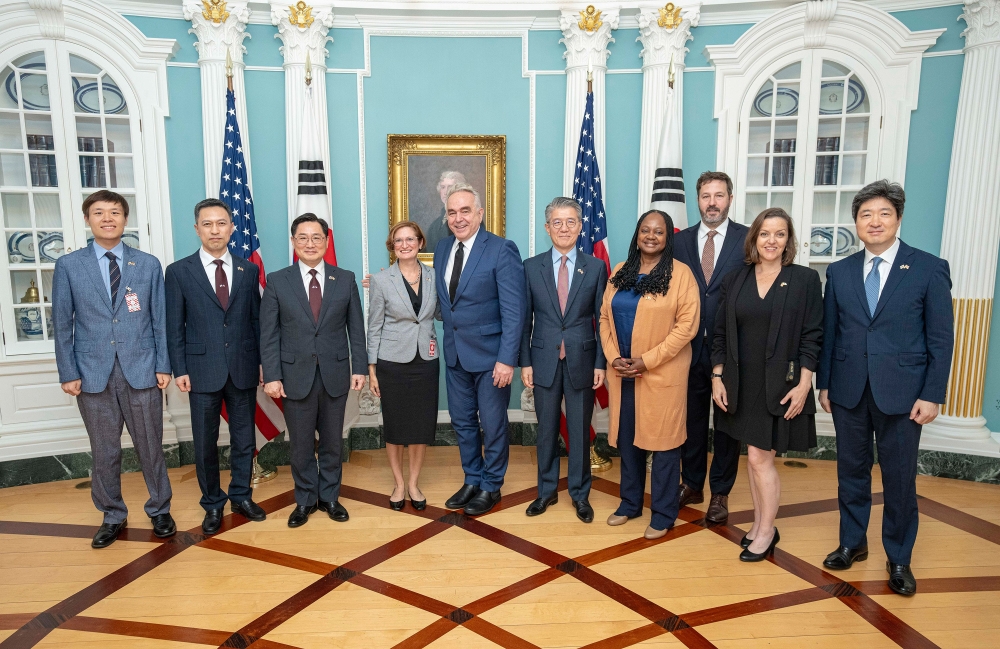-
About the Ministry
About the Ministry
- Press
- Countries & Regions
- Policy Information
- Life In Korea
Ministry News
- Notices
- Ministry News
- Press Releases
- Press Briefings
- Speeches & Published Materials
- Newsletter Service
- Diplomatic White Paper
United States-Republic of Korea Joint Press Release 5th Extended Deterrence Strategy and Consultation Group
- Date
- 2024-09-05
- hit
- 50431

United States-Republic of Korea Joint Press Release
5th Extended Deterrence Strategy and Consultation Group
On September 4, 2024, the foreign affairs and defense agencies of the United States and Republic of Korea (ROK) convened the fifth meeting of the Extended Deterrence Strategy and Consultation Group (EDSCG) in Washington. Under Secretary of State for Arms Control and International Security Bonnie Jenkins and Acting Deputy Under Secretary of Defense for Policy Cara Abercrombie led the U.S. delegation. ROK First Vice Minister of Foreign Affairs Kim Hong Kyun and Deputy Minister for National Defense Policy Dr. Cho Chang Lae led the ROK delegation.
The EDSCG serves as a key annual forum for the Alliance to discuss and coordinate on security strategy and policy issues affecting the Korean Peninsula and broader Indo-Pacific. The fifth EDSCG built on the progress of the previous years’ meetings and carried forward the significant Alliance efforts to strengthen extended deterrence since the April 2023 announcement of the Washington Declaration.
In the meeting, participants shared assessments on the DPRK’s dangerous and irresponsible behavior, including its ongoing missile launches and continued pursuit of weapons of mass destruction and ballistic missile programs in violation of the relevant United Nations Security Council (UNSC) resolutions. Both sides also shared concerns on the DPRK’s recent reckless and dangerous behaviors along the DMZ that raise the risk of inadvertent escalation on the Peninsula. Both sides reaffirmed their commitment to the complete denuclearization of the Korean Peninsula consistent with UNSC resolutions. The two sides committed to further enhance coordination to address DPRK sanctions evasion, including malicious cyber activities, and bolster deterrence against DPRK nuclear attacks, as well as non-nuclear WMD attacks, which pose a threat of high consequence, strategic-level attacks to the Alliance. The United States reiterated its strong support for President Yoon’s aim to open a path for serious and sustained diplomacy with the DPRK, and the goals of the ROK's Audacious Initiative. Both sides reaffirmed that they remain open to dialogue without preconditions.
The ROK and the United States condemned the military cooperation between the DPRK and Russia, including arms transfers, which are in direct violation of UNSC resolutions, and identified measures to address the challenge posed by increased DPRK-Russia security cooperation. Both sides resolved to closely monitor what Russia provides to the DPRK and urged Russia and the DPRK to abide by the relevant UNSC resolutions.
The ROK and the United States recognized the deepening interconnectedness between the Indo-Pacific and the Euro-Atlantic and discussed the implications for deterrence and U.S. nuclear posture. The two sides considered the impact of non-nuclear threats to the Alliance, including emerging technologies, and committed to leverage Alliance technology advantages to enhance the Alliance’s deterrence and defense posture. They pledged to continue to utilize the diplomatic, informational, military, and economic tools available to the Alliance to strengthen deterrence and reinforce the U.S. security commitment to the ROK. To that end, both sides committed to cooperating with likeminded partners to counter foreign misinformation on extended deterrence. Both sides welcomed the significant advances made by the Nuclear Consultative Group (NCG) in its first year, including the completion and signing of the NCG Guidelines. In the context of a deteriorating security environment, the principals conducted a scenario-based discussion, for the first time at the EDSCG, to strengthen policy planning and coordination.
Acknowledging mounting regional threats, the ROK and the United States committed to continue close cooperation to ensure that ROK and U.S. strategies and postures enhance peace and stability in the Indo-Pacific. The United States reiterated its ironclad commitment to draw on the full range of its military capabilities, including nuclear, to support extended deterrence for the ROK. Both sides reaffirmed that any nuclear attack by the DPRK against the ROK will be met with a swift, overwhelming, and decisive response, and the United States reiterated that any nuclear attack by the DPRK against the United States or its allies is unacceptable and will result in the end of that regime.
The co-chairs met with Deputy Secretary of State Kurt Campbell in the State Department Treaty Room, where they applauded the EDSCG as an enduring Alliance forum to strengthen extended deterrence through cooperation between both countries’ diplomatic and defense establishments. Following the meeting, the principals visited the National and Nuclear Risk Reduction Center and praised the rich history of the Alliance at a press conference, where they commended the continued progress of the EDSCG. The next high-level EDSCG meeting will be held in 2025.




